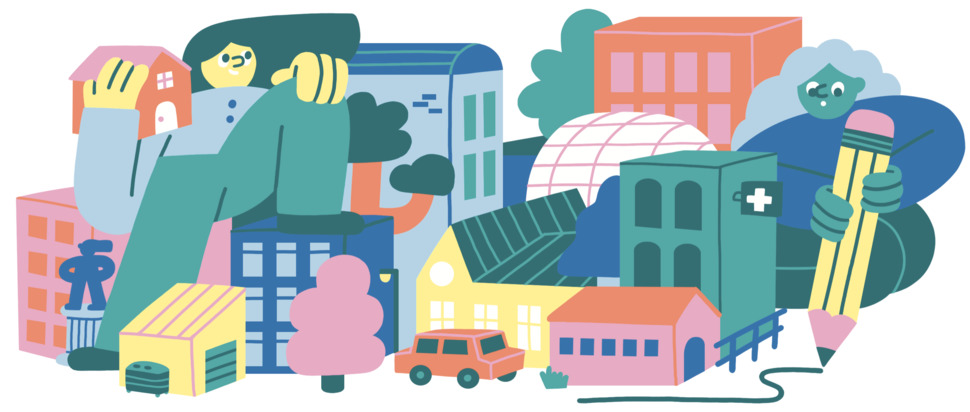Mapping with Intent: Feminist city planning
Who are our cities built for? And how does this impact our daily lives? One writer explores Scottish cities' recent move towards feminist urban planning and unpacks what this should look like – in policy and in public
In May, Scottish Greens Councillor Kayleigh O’Neill successfully passed a motion to promote feminist urban planning in Edinburgh. The motion looked at gender equity in town planning, following in the footsteps of fellow Greens Councillor Holly Bruce’s motion in 2022 calling for feminist town planning in Glasgow. These motions reject the apparent gender neutrality in urban planning because often marginalised genders are disadvantaged, their experiences excluded in the design. Glasgow was the first UK city to make this pivotal step, with Edinburgh now joining the ranks – it’s clearly an exciting time for Scotland, allowing us to truly question how we want to live.
You might be wondering – what is a feminist city? A feminist Edinburgh, for instance, could look like a city where women can access everything inclusively and safely, from healthcare to transport, from childcare to mobility needs. It could present a radical shift in how we view urban planning. Even aesthetically thinking about our city, there are only five statues in Edinburgh of women – and one of them is Queen Victoria.
For those of us who aren’t long-dead monarchs, access to healthcare is key. Recently in Scotland, the topic of access to abortion healthcare without protest has come up. Thousands having abortions every year end up attending a clinic or hospital targeted by anti-choice groups. The brilliantly run campaign from Back Off Scotland has put buffer zones on the table, but it’s been a hard-won process. These zones – already in place across England and Wales – would prevent protestors from gathering within 100 metres of a clinic or hospital. The proposal for the legislation should be published by July. A feminist city should enable access to all healthcare without stigma or protest.
But we should also feel safe in our homes. The ‘gender rent gap’ means that often women earn less and therefore spend a greater proportion of their salary on rent. In January 2022, SpareRoom ran a survey that found almost a third of women reported spending over 50% (classed as severely rent burdened) of their salary on rent, compared to only 14.4% for men. Scotland's recent rent freeze ended in March 2023, so now landlords can increase their rents by 3%; however, this is meaningless for anyone moving or changing tenancies, allowing rents to skyrocket. The Scottish Government has committed to rent controls within this term but we need them immediately. We also desperately need more public housing: without it, marginalised genders will be priced out of the city. Living in this city for over nine years, often moving every year, I can attest to how brutal the housing market here has become – it’s why I became involved in Living Rent, Scotland’s tenant and community union.
Meanwhile, our public spaces and services have been stripped bare through austerity. Across Scotland, communities are organising around this injustice: Living Rent branches are campaigning around park lighting in Leith, public toilets in Gorgie Dalry, and broken streetlights in Govanhill. Many of these issues affect marginalised genders disproportionately, unable to feel safe in our streets or access a free toilet. With wins at the council level, it is clear communities care deeply and will not rest until we have livable cities for us all. A feminist urban planning approach would centre the experiences of marginalised genders within the design of our public spaces and incorporate safety as a key feature.
And when it comes to safety, transport is a vital part of examining who our cities are built for. Late-night travel is poor, with infrequent night buses and expensive taxis. Women, particularly in Scotland where the dark begins at 3pm in the winter, are more vulnerable to the risk of assault. Unite the Union’s ‘Get Me Home Safely’ Campaign calls for employers to pay for transportation to get workers home after a late shift. The successful campaign has already been backed by Edinburgh, Glasgow, and other Scottish councils and workers are already starting to see the benefits of safe and free transport home past the last public transport. After working in several hospitality venues, I can attest to how unsafe getting home can feel late at night. Nevertheless, there should be more options for marginalised genders to get home safely from work without relying on often unreliable employers to pay for taxis.
The last Edinburgh council budget was mired in controversy and party political clashes – aside from the drama, there were massive cuts in the budget for the council. How far can any council deliver a feminist city when there is barely enough money to keep the city running as it is?
Our public services have been decimated through cuts and austerity, and there are no signs of this slowing down. Post-pandemic, as the town centres recover and we face an ongoing housing crisis that shows no signs of stopping, can we dare to dream of a more equitable and radical path for our cities? I truly hope so.
